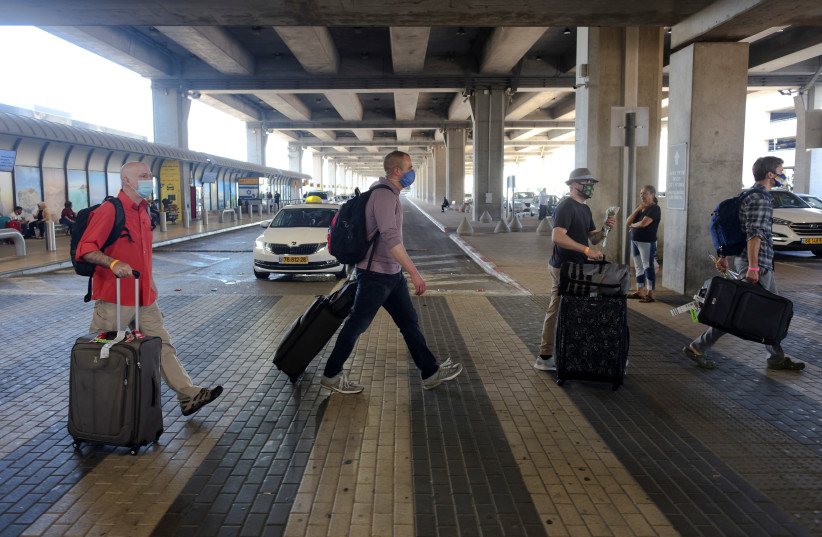Viewers who found three hours to watch the Knesset Law and Constitution Committee hearing to approve adding several nations to Israel’s no-fly list on Tuesday were rewarded with several surreal moments.
MK Yomtob Kalfon shared the story of a constituent who commutes between Israel, where her family and children live – including a four-year-old girl – and France, where she works.
A day earlier, France had been labeled as red by Israel, making it prohibited for an Israeli citizen to travel there without special permission from a so-called “exceptions committee.”
Kalfon asked Amnon Shmueli, a representative of the Immigration and Population Authority – the body in charge of the committee – who decided that in order to receive such permission, the woman, a dual citizen, had to commit not to return to Israel for 90 days, as she was told when she applied to be allowed to travel.
“The criteria is to leave for the permanent place of residence, where the person’s center of life is,” said Shmueli, director of the Authority’s Ben-Gurion Airport unit. “It does not cover people who work abroad.”

Kalfon and other MKs – including Eitan Ginzburg who was chairing the committee – asked several times who set the criteria, why 90 days and not 60, or 30, why center of life and not work. In the back-and-forth discussion between the MKs and Shmueli, he did not provide a clear answer and simply repeated that the regulations said “permanent place of residence,” and 90 days is how the committee interpreted it.
“I think that this question needs to be put to the interior minister, under which the Population Authority operates, or to the director-general at the authority,” concluded Ginzburg.
However, perhaps an even more pressing question: how is it possible that the fundamental rights of citizens – such as freedom of movement – can be restricted by anonymous officials at bodies that can operate without any oversight?
In the past two weeks, 20 countries in Europe and North America were added to 50 African nations, including South Africa, on Israel’s red list in light of the threat of the Omicron variant.
The group includes countries with crucial diplomatic and commercial ties with Israel, in some cases also home to sizable Jewish communities, such as the United States, Canada, the United Kingdom, France and Germany.
Israel is a country of immigrants. According to 2020 data by the Central Bureau of Statistics, around 1.5 million Israelis were born abroad.
As pointed out by the MKs during the Knesset committee debate, there are tens of thousands of families whose financial stability depends on the ability of one parent to travel abroad, without even mentioning the personal ties they may have.
On Thursday, Kalfon posted on his Facebook account that he had asked Interior Minister Ayelet Shaked – a fellow member of Yamina – to reduce the number of days from 90 to 30, and she agreed. While this undoubtedly will represent an important improvement for many Israelis if confirmed, is it right that such a significant matter should thus be addressed, almost by chance?
There was a similar situation last month, when Israel closed its borders to foreigners and before most countries were designated red. First-degree relatives of Israelis could receive permission to come for weddings and bar/bat mitzvas, but not for births.
After many protests led by NGO Yad L’Olim, Shaked decided that parents of women giving birth would be eligible to receive permission to enter, but just a week before the official due date, and up to a month afterward. What about at-risk pregnancies, or the fact that it is common for babies to be born earlier than expected? These matters were not taken into consideration.
Parents of the fathers were also not included in the criteria, until more protests prompted a change to allow them to also obtain permission to enter.
During the Knesset meeting, Shmueli revealed that the current Exceptions Committee is made up of two teams of five people, and that over the previous 24 hours, those 10 people had received more than 4,500 requests. The committee has to examine both the applications of Israelis who wish to leave, and those of foreign nationals to enter.
Once again, how can such a crucial task be left to just 10 overstretched workers?
And yet, this nightmarish scenario of uncertainty, lack of accountability and indifference appears to recur repeatedly.
During the Knesset panel discussion on Tuesday, Shmueli was asked by former MK Dov Lipman, founder and head of Yad L’Olim, to confirm that the authority sent a document to Israeli consulates abroad detailing new exceptions that would permit foreign nationals to travel to Israel from red countries for special circumstances – specifically, life-cycle events of family members, such as births, bar/bat mitvzahs and weddings. Shmueli confirmed that the document was official.
A spokesperson for the authority later told The Jerusalem Post that the authority’s website – the only place where official guidelines are published – would be updated that day with the new criteria.
But as of Thursday night, the website had not been updated, and the authority did not respond to requests by the Post for an explanation.
In addition, the English version of the website – a crucial service, since it specifies rules for people who are not Israeli, including visa holders – is constantly not up to date. Links to documents or forms often do not work, and both the Hebrew and the English pages remain chaotic.
A democratic country does not restrict its citizens’ basic rights without any form of oversight, either by the legislature, the body elected directly by the people and where their representatives sit; or at least with clear and transparent criteria. Even during a pandemic, and especially two years after it began, Israel can, and must, do better.
